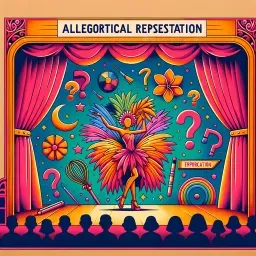Keep moving forward

0
0
0
0
- Meaning
- The phrase 'Keep moving forward' speaks to the human condition's resilience, emphasizing the importance of progress despite difficulties. Philosophically, it aligns with concepts of stoicism, which advocates for enduring challenges with a focus on personal growth and the acceptance of change. Psychologically, it suggests an active response to adversity, promoting a mindset centered on growth, adaptation, and hope. Historically, this phrase encapsulates a forward-thinking attitude that has driven innovation across cultures and epochs, encouraging individuals not to dwell on past failures but to look ahead with optimism.
- Allegory
- The allegorical image incorporates key elements such as a winding pathway that signifies life's journey, symbolizing the continuous movement forward. The blooming flowers along the path represent growth and new beginnings, while the bright skies convey a sense of hope and positivity. The silhouette of a person walking along the road embodies determination and the active pursuit of dreams, reinforcing the message of resilience. The small hurdles present along the way serve as reminders of the challenges one may face but also highlight that obstacles are a natural part of progress. Overall, the image encapsulates the essence of 'Keep moving forward' by evoking feelings of motivation, determination, and optimism.
- Applicability
- In daily life, the lesson from this phrase can apply to personal and professional goals, reminding individuals to persist through obstacles and setbacks. It encourages the practice of learning from failures rather than allowing them to halt progress, thereby fostering a proactive approach toward achieving one's ambitions. Whether tackling a difficult project at work or navigating personal challenges, this mindset promotes perseverance, ultimately leading to personal growth and fulfillment.
- Impact
- The impact of 'Keep moving forward' has been profound, inspiring countless individuals and movements that promote resilience and a positive outlook on life. It has been quoted in various motivational speeches, books, and films, becoming a mantra for not just personal ambition but also collective human progress. This phrase resonates particularly in business and self-development contexts and is often cited during discussions about overcoming failure or adversity.
- Historical Context
- The phrase likely gained prominence in the mid-20th century, aligning with the post-WWII era's emphasis on innovation and progress. During this period, society was focused on recovery, rebuilding, and embracing new opportunities, echoing the sentiment of moving forward amid adversity. The phrase's context reflects a collective desire for forward momentum during a time of significant change and hope.
- Criticisms
- Criticism of the phrase may arise from arguments that it promotes a culture of relentless activity without acknowledging the need for rest or reflection. Some may argue that constantly moving forward can lead to burnout or neglecting one’s current emotional or mental state. Critics might suggest that slower, more intentional progress can sometimes be more beneficial than an unwavering drive forward, advocating for balance between action and introspection.
- Variations
- Variations of this phrase exist in various cultures, such as 'Onward and upward' in English-speaking contexts, which conveys a similar meaning. In Asian cultures, the idea of 'taking one step at a time' reflects a more measured approach to progress and can significantly alter interpretations emphasizing the importance of patience and careful advancement.
-

Nobody gets left behind.
-

The flower that blooms in adversity is the most rare and beautiful of all.
-

I’m bad, and that’s good. I will never be good, and that’s not bad.
-

You gotta put your behind in your past.
-

Float like a Cadillac, sting like a Beemer.
-

What do you want me to do, dress in drag and do the hula?
-

This is my family. I found it, all on my own. It’s little and broken, but still good. Yeah, still good.
-

A dream is a wish your heart makes.
-

I’m gonna wreck it!
-

Put that thing back where it came from or so help me!
-

What can I say? I’m a rebel.
-

It’s kind of fun to do the impossible.
No Comments